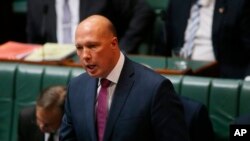New terror legislation to stop foreign fighters from returning to Australia has been approved by lawmakers. The government says the new laws will prevent carnage in Australia. But experts say the exclusion measures will apply mostly to women and children, and will increase the risk of radicalization.
Australia government officials say the new law will give intelligence agencies time to "manage the flow of foreign fighters" back to Australia. It will allow the government to exclude an Australian citizen for up to two years if they are considered to be a security risk.
It is estimated that 230 Australians traveled to Iraq and Syria to fight with militant groups. About 40 are thought to have returned home, raising fears they have brought home not only a dangerous ideology but combat skills. Government lawmaker Andrew Hastie said returning militants brought with them "hard hearts and a proven capacity for violence and bloodshed."
Australia says the new measures are similar to those in Britain.
Home Affairs Minister, Peter Dutton, said the laws will make Australia safer.
"The government now is asking for the support of this parliament to introduce legislation to temporarily exclude those people who we believe would come to our country to cause death and carnage in Australia," he said.
The new laws to ban foreign fighters from returning to Australia will mostly apply to women and children, many of whom are held in refugee camps. That is according to Michele Grossman, an authority on violent extremism who works with the Australian Federal Police.
She said forcing people to stay in poor conditions in camps puts them at greater risk of developing resentment against Australia and of greater radicalization.
The Law Council of Australia, the country's leading advocacy group for lawyers, says the law could be unconstitutional.
It will take effect next month. Dutton has said repatriations would be decided case by case, particularly where young children were involved.




